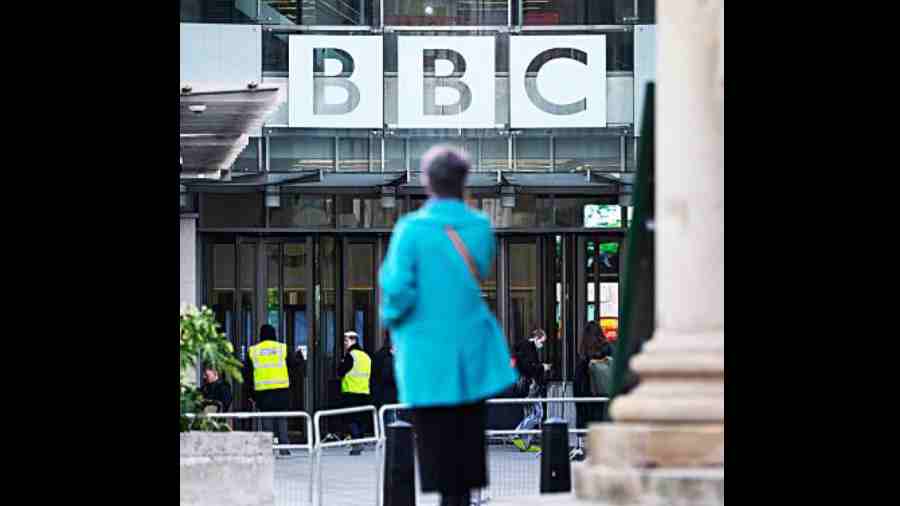BBC bashing
My father was the producer of Bichitra, the Bengali programme on the BBC’s World Service, so he would have had nothing to do with political decisions taken by other departments. The BBC is not a monolithic organisation with decisions taken centrally, on whether to do a two-part documentary, India: The Modi Question, for instance. That was a choice made by a small group of people in current affairs. I wouldn’t be surprised if the proposal first came from outside, probably a freelance Indian producer, and was then greenlighted by editors.
As the prime minister, Boris Johnson boycotted the BBC and refused to appear on the agenda-setting Today programme on BBC Radio 4. His culture secretary, Nadine Dorries, threatened to defund the BBC by abolishing the licence fee. The organisation is thus used to ‘BBC bashing’. Last week, The Daily Telegraph ran a leader, “The BBC is failing on impartiality”. This wasn’t about the Modi documentary but about an independent report which said many BBC journalists “lack understanding of basic economics”. “This isn’t another piece of ‘BBC bashing’ but a serious point made by independent scrutineers about a key aspect of the corporation’s remit: to inform in an unbiased way,” said The Telegraph.
Meanwhile, I have been reading N Ram’s piece in Prospect magazine about “How Narendra Modi tried to censor a critical BBC documentary — and failed miserably.”
Empire and erasure
Alan Cummings, a well-known Scottish actor, has marked his 58th birthday by returning the OBE he was given in 2009 because “OBE stands for Officer of the British Empire”. He says he longer wishes to be associated with “the toxicity of empire”. He is not the only one who thinks the word, “empire”, should be replaced with “excellence” in OBE.
I did history for my ‘O’ levels but the controversial subject of Empire, especially the colonial period in India, is not touched. For example, would Winston Churchill be portrayed as the great wartime prime minister or the man responsible for millions of deaths in the Bengal famine? Sathnam Sanghera says he has been much abused by right-wingers for his book, Empireland, while William Dalrymple has not been targeted despite being critical of the raj for over 30 years.
Predictably, some commentators have attacked Cummings for being ‘woke’. There is a divide between the old and the young in Britain today with the latter believing that the Empire was a very bad thing.
Tug of war
Generous tributes have been paid to the journalist, Donald Trelford, who died, aged 85, on January 27. He edited the Observer for 18 years, “while fighting for much of that time to preserve its existence, its editorial integrity and its separate identity under three successive owners”.
The obituary notices also tell how he and Andrew Neil, who was editing the rival Sunday Times, competed for the affections of Pamela Singh, a former Miss India who reinvented herself as Pamella Bordes.
The Times noted last week: “Bordes had been in a relationship with Andrew Neil… Neil had broken off the affair in 1988 and she took it badly, allegedly slashing his expensive suits with a pair of scissors. She then sought further vengeance on Neil by stepping out with Trelford.”
The story broke in March 1989 with The Sun turning Trelford’s denial of an affair into the headline, “I’M NO DIRTY DON”, while the Sunday Telegraph ran an editorial railing against ‘playboys’ editing newspapers. Neil successfully sued over the article, albeit winning only £1,000 in damages plus costs.
When Neil testified that Trelford tried to take Bordes away from him, The Sun obliged with a huge frontpage headline: “Dirty Don Tried to Pull My Pam, says Randy Andy”. I now think Pamela was more sinned against than sinning. She used to turn up at The Sunday Times to see Neil just as we were preparing to go to press. She would draw attention to her ‘exotic’ looks by using the long aisle between the desks in the newsroom as a sort of fashion catwalk.
Quizzical disposition
Nowadays many more Indian origin students appear on University Challenge, a TV quiz show which began in 1962 and brings together some of the cleverest young people in the country. Last week’s clash for a quarter-final place pitted University College, Oxford, against Jesus College, Cambridge. The former’s team included Alice Chakraborty, reading classics and English, while the latter’s had Sameer Aggarwal, who is studying engineering.
The irascible presenter, Jeremy Paxman, scowled as he began: “Ok, you all know the rules by now, let’s get on with this, shall we?”
The questions are still biased in favour of students who have read classics but, these days, Indian-origin students seem to know a lot more about the arts. Incidentally, Jesus College beat University College 160-85.
Footnote
Boris Johnson has picked up an advance of £510,000 for his forthcoming memoirs — even though he has so far done just 10 hours of work on it. It follows the announcement by publishers HarperCollins that they had acquired the rights to what was described as prime ministerial memoirs “like no other”. Boris’s take on Rishi should be fascinating.










